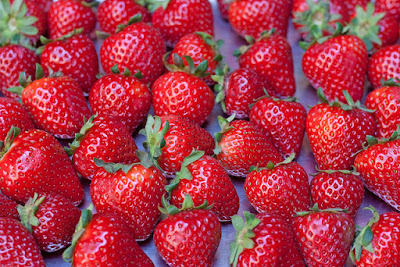A few years ago, I landed a plot in my local community garden. Eager to
create a sanctuary for myself in the city, I filled the tiny space with tomato
plants, bell peppers, thyme, sage, parsley, and jalapeños at my mom’s
insistence. Contented with my efforts, I cooed over the seedlings until I
noticed a small patch of grasshopper-green plants in a neighboring plot. Their
deeply grooved leaves sat close to the ground. Having picked strawberries for
many summers as a child, I knew that dainty white flowers would soon appear
among the leaves and that the blossoms would morph into glossy, red berries. I
kicked myself for forgetting to plant them. I soon realized it would take an
acre of land to satisfy my craving for the cushy, floral fruit, and I headed to
the market where they were already on display.
An alluring shade of red, strawberries waken all the senses. Dress them up
with chocolate or eat them straight off the stem. A cup of the berries exceeds
the recommended daily dose of vitamin C; the tiny seeds that polka-dot the
outer skin provide fiber. The sinfully delicious fruit also contains an
infusion of antioxidants, which guard against heart disease. So take the time
to enjoy the exquisite fruit.
How to Select Strawberries
Strawberries stop ripening after they are picked. So select red berries
without any green or white patches. They should be glossy, plump, and free of
soft spots. According to The Environmental Working Group, strawberries are
among the foods that have the most pesticide residue. So opt for organic.
How to Store Strawberries
To freeze: If you plan to store strawberries for more
than three days, it’s best to freeze them. It takes very little effort!
Wash the berries and hull them by slicing off their green caps.
Lay them on a paper towel to dry.
Lay the berries on a cookie sheet lined with a fresh paper towel and place
them in the freezer.
When the berries are frozen, transfer them to freezer bags or a freezer-safe storage container. Store them in the freezer.
How to Prepare Strawberries
To slice: Wash the berries. Lay a berry on its side and slice off the green cap. Hold the wide end of the berry with one hand. With a paring knife in the other hand, slice the berry widthwise, starting at the tip.(If you prefer, you can slice strawberries lengthwise from side to side for teardrop-like slices.)
To chop: Wash the berries. Lay a berry on its side and slice off the green cap. Using a paring or chef's knife, slice the berry in half lengthwise. Slice each half down the middle lengthwise. Line the cut pieces up together lengthwise. Cut them widthwise starting at their narrowest ends. Run a knife across the cut pieces to finely chop.
Strawberries can be stored in the refrigerator for up to three days. Leave
the stems intact and lay the unwashed berries in a single layer on a cookie
sheet. Pick out any moldy fruit to keep mold from spreading. Place the berries
in the refrigerator uncovered. Wash and hull the strawberries before devouring
them.
Wash the berries and hull them by slicing off their green caps.
Lay them on a paper towel to dry.
When the berries are frozen, transfer them to freezer bags or a freezer-safe storage container. Store them in the freezer.
To slice: Wash the berries. Lay a berry on its side and slice off the green cap. Hold the wide end of the berry with one hand. With a paring knife in the other hand, slice the berry widthwise, starting at the tip.(If you prefer, you can slice strawberries lengthwise from side to side for teardrop-like slices.)
To chop: Wash the berries. Lay a berry on its side and slice off the green cap. Using a paring or chef's knife, slice the berry in half lengthwise. Slice each half down the middle lengthwise. Line the cut pieces up together lengthwise. Cut them widthwise starting at their narrowest ends. Run a knife across the cut pieces to finely chop.









No comments:
Post a Comment
Share your thoughts!